In Focus This Week
“The Ways States Pay for Election Administration”
By April Tan, Policy Lead and Shaniqua Williams, Research Fellow
Center for Election Innovation & Research
Election administration is plagued by inconsistent and inadequate funding. This has major consequences for voters and places undue stress on officials. As demands on election systems grow, it is critical that administrators have enough funding to perform their duties effectively.
 To inform the conversation around how states can provide sufficient and reliable funding to election officials, the Center for Election Innovation & Research (CEIR) released a report examining different ways states pay for election administration. Election officials and policymakers can draw on the examples highlighted in the report as they look for ways to fund elections.
To inform the conversation around how states can provide sufficient and reliable funding to election officials, the Center for Election Innovation & Research (CEIR) released a report examining different ways states pay for election administration. Election officials and policymakers can draw on the examples highlighted in the report as they look for ways to fund elections.
“The Ways States Pay for Election Administration” describes seven broad categories of funding mechanisms, illustrated with state-specific examples from the last five years:
- Earmarking revenue
- Automatic increases
- Flexible funding
- Non-public funding
- Issuing bonds
- Dedicated appropriations
- Economies of scale
The examples come from a scan of legislation enacted by states between 2019 and 2024. While not exhaustive, they showcase a range of approaches states have taken to meet evolving election needs. Some were designed to fund the implementation of new policies, while others aim to provide reliable funding streams or maximize available funding. Because election funding in the U.S. is highly decentralized and varies from state to state, needs and solutions differ by jurisdiction. Still, the models described can serve as a starting point for discussion and further research. For example:
- In Michigan, the legislature appropriated tens of millions of dollars to implement new election policies including early voting and no-excuse absentee voting. The state allocated up to $30 million of those funds as incentive grants to encourage local jurisdictions to coordinate on implementing early voting. Without this funding, local jurisdictions would have had to bear the entire cost of implementing these policies.
- States may require funds to be earmarked for election expenses more broadly. In West Virginia, counties are required to set aside a portion of certain excise taxes for election administration, infrastructure, and security. The state prohibits these funds from being redirected for other purposes unless the secretary of state determines the county meets minimum requirements for reserve funding, physical security, and cybersecurity standards.
- Some states reimburse local jurisdictions for a portion of certain election expenses. For example, Washington makes sure local jurisdictions aren’t on the hook for the state’s share of expenses in statewide general elections by requiring the secretary of state to reimburse local jurisdictions for relevant expenses. The secretary must make a budget request to the legislature for more funding if the secretary does not have enough funding to reimburse all its expenses.
While there is no silver bullet to solve the election funding challenge, this report highlights some impactful and creative ways states can fund elections within existing public finance mechanisms.
For more information on funding mechanisms for election administration, read the report at electioninnovation.org/research/ways-states-pay-for-elections.
For more on election funding, keep an eye out for CEIR’s upcoming report “Who Pays for Elections,” which explores how financial responsibility for elections is divided between state and local governments.
Upcoming Schedule Changes
 electionline Daily News will post by 8am Eastern on August 20, 21 and 22 and by 10 am Eastern on August 28 and 29.
electionline Daily News will post by 8am Eastern on August 20, 21 and 22 and by 10 am Eastern on August 28 and 29.
electionlineWeekly will post by 2pm Eastern on Thursday, August 21.
Election Center at 40
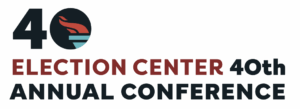 The year was 1985. The top song for the year was “Careless Whisper” by Wham, “Back to the Future” was the number one grossing movie and Live Aid was the event of the year.
The year was 1985. The top song for the year was “Careless Whisper” by Wham, “Back to the Future” was the number one grossing movie and Live Aid was the event of the year.
Also that year, elections officials from all over the country gathered in New Orleans for Election Center’s first Annual Conference.
This year, as Election Center members gather in Salt Lake City for its 40th Annual Conference, we want to highlight some of those past gatherings. If you have photos from any of our past conferences that you’d like to share, please email them to press-media@electioncenter.org or you can post them on socials and tag #ElectionCenter40 –we understand this is going to require some scanning for older photos!
electionline Daily News Email
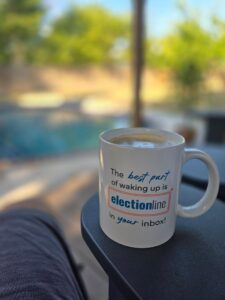 What’s the best part of waking up? electionline Daily News in your inbox of course so be sure to sign up for your daily dose.
What’s the best part of waking up? electionline Daily News in your inbox of course so be sure to sign up for your daily dose.
Each morning you’ll receive the top headlines of the day, plus a listing of states featured in that day’s news round up.
To sign up, simply visit our site and provide us with your email and you’ll begin receiving the news in your inbox each morning.
We Google so you don’t have to!
Election News This Week
 Federal Update: More states have officially responded to the U.S. Department of Justice’s request for voter data including Maine, Oregon and Vermont. According to Votebeat, DOJ is seeking additional information from Pennsylvania. In a letter, sent to Secretary of the Commonwealth Al Schmidt on Aug. 4, DOJ asked the state for a copy of its voter rolls — which it had not requested in its previous communications with Pennsylvania about election security — as well as information on the state’s answer to a survey about election administration. According to Votebeat, Texas’ letter from the DOJ is also seeking a list of state and local elections officials responsible for voter list maintenance since November 2022. Christina Adkins, director of the election division at the Texas Secretary of State’s Office told election officials this week that the state would handle the request from the Justice Department the same way it would a public-records request, as several other states have. Several states, including Ohio and West Virginia are considering the impacts the March Executive Order on elections may have on voting equipment in their states. The order directs federal officials to amend the Voluntary Voting System Guidelines, which are indeed voluntary, but some states, including Ohio, require compliance with the most recent guidelines in state statute. The guidelines updates would bar voting machines “in which a vote is contained within a barcode or quick-response code” unless it’s necessary to accommodate people with disabilities. The order goes on to state ballots “should provide a voter-verifiable paper record.” According to the Ohio secretary of state, the majority of Ohio counties still use hand-marked paper ballots. But 28 counties use a machine that prints out voters’ selections, and another 13 use a machine that directly records a person’s vote while producing a paper record. West Virginia Secretary of State Kris Warner says the state is preparing to adjust. “Quite frankly, we have a plan B and a plan C based on whether we’re going to be able to use the machines that we’ve used in the past,” Warner said. “We’re hopeful that that’s going to be the case, but we’re unpacking that presidential executive order right now.”
Federal Update: More states have officially responded to the U.S. Department of Justice’s request for voter data including Maine, Oregon and Vermont. According to Votebeat, DOJ is seeking additional information from Pennsylvania. In a letter, sent to Secretary of the Commonwealth Al Schmidt on Aug. 4, DOJ asked the state for a copy of its voter rolls — which it had not requested in its previous communications with Pennsylvania about election security — as well as information on the state’s answer to a survey about election administration. According to Votebeat, Texas’ letter from the DOJ is also seeking a list of state and local elections officials responsible for voter list maintenance since November 2022. Christina Adkins, director of the election division at the Texas Secretary of State’s Office told election officials this week that the state would handle the request from the Justice Department the same way it would a public-records request, as several other states have. Several states, including Ohio and West Virginia are considering the impacts the March Executive Order on elections may have on voting equipment in their states. The order directs federal officials to amend the Voluntary Voting System Guidelines, which are indeed voluntary, but some states, including Ohio, require compliance with the most recent guidelines in state statute. The guidelines updates would bar voting machines “in which a vote is contained within a barcode or quick-response code” unless it’s necessary to accommodate people with disabilities. The order goes on to state ballots “should provide a voter-verifiable paper record.” According to the Ohio secretary of state, the majority of Ohio counties still use hand-marked paper ballots. But 28 counties use a machine that prints out voters’ selections, and another 13 use a machine that directly records a person’s vote while producing a paper record. West Virginia Secretary of State Kris Warner says the state is preparing to adjust. “Quite frankly, we have a plan B and a plan C based on whether we’re going to be able to use the machines that we’ve used in the past,” Warner said. “We’re hopeful that that’s going to be the case, but we’re unpacking that presidential executive order right now.”
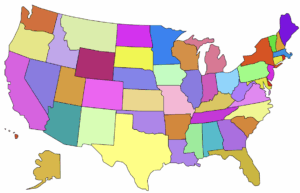 Redistricting Impacts: With politicians still duking it out over redistricting, elections officials in potentially impacted states are starting to brace for what it all may mean. According to Votebeat, planning for the March 2026 primary election in Texas is already underway, but election officials say they can’t move forward without finalized maps — and the first key deadline, mandated by the state, is coming Sept. 9. “Who knows if we’ll have enough time?” said Chris Davis, the voter registration director in Travis County. He told Votebeat the Sept. 9 deadline is when county precinct chairs — who represent their political party in a precinct within their neighborhood — can begin filing to run in the primary. A new map could shift precinct boundaries entirely. In California, where a special election to ask residents if they want to redistrict could be held in conjunction with November elections. However, only 20 of the state’s 58 counties have some form of an election this fall and experts anticipate a statewide special election could cost up to $200 million. Some counties are already preparing for the possibility, “We usually send out military and overseas ballots 60 days before the election,” said Imperial County Registrar of Voters Lindsay Dale. “It’s a very, very tight deadline.” The overall cost to hold the special election in the county, she said, would be between $500,000 and $600,000, and no one knows yet if the county would be reimbursed for the election cost. Orange County registrar of voters Bob Page isn’t waiting around for the official call, according to the Orange County Register. He’s setting plans in motion, should Newsom and the Legislature move forward with an emergency election. It’s not easy, Page said, to prepare for something that may or may not happen. But there’s so much that goes into holding an election — vote centers must be secured, a list of those centers has to be printed for voters to consult, staff need to be hired and trained, among a bevy of other things on the election to-do list — that Page said he cannot afford to wait. “I have a responsibility to expend Orange County taxpayer resources efficiently and wisely,” Page told the OC Register. Fresno County Clerk/Registrar of Voters James Kus said a tight deadline could push up costs. “My biggest concern is not the deadlines but the state paying for this election,” Kus said. He estimates it could cost the county $4 million to hold the election.
Redistricting Impacts: With politicians still duking it out over redistricting, elections officials in potentially impacted states are starting to brace for what it all may mean. According to Votebeat, planning for the March 2026 primary election in Texas is already underway, but election officials say they can’t move forward without finalized maps — and the first key deadline, mandated by the state, is coming Sept. 9. “Who knows if we’ll have enough time?” said Chris Davis, the voter registration director in Travis County. He told Votebeat the Sept. 9 deadline is when county precinct chairs — who represent their political party in a precinct within their neighborhood — can begin filing to run in the primary. A new map could shift precinct boundaries entirely. In California, where a special election to ask residents if they want to redistrict could be held in conjunction with November elections. However, only 20 of the state’s 58 counties have some form of an election this fall and experts anticipate a statewide special election could cost up to $200 million. Some counties are already preparing for the possibility, “We usually send out military and overseas ballots 60 days before the election,” said Imperial County Registrar of Voters Lindsay Dale. “It’s a very, very tight deadline.” The overall cost to hold the special election in the county, she said, would be between $500,000 and $600,000, and no one knows yet if the county would be reimbursed for the election cost. Orange County registrar of voters Bob Page isn’t waiting around for the official call, according to the Orange County Register. He’s setting plans in motion, should Newsom and the Legislature move forward with an emergency election. It’s not easy, Page said, to prepare for something that may or may not happen. But there’s so much that goes into holding an election — vote centers must be secured, a list of those centers has to be printed for voters to consult, staff need to be hired and trained, among a bevy of other things on the election to-do list — that Page said he cannot afford to wait. “I have a responsibility to expend Orange County taxpayer resources efficiently and wisely,” Page told the OC Register. Fresno County Clerk/Registrar of Voters James Kus said a tight deadline could push up costs. “My biggest concern is not the deadlines but the state paying for this election,” Kus said. He estimates it could cost the county $4 million to hold the election.
 Trouble in Paradise: According to Virgin Islands Public Broadcasting a Virgin Islands Board of Elections meeting that began in person August 7 on St. Croix but shifted to a videoconference between districts ended abruptly in chaos and confusion after members walked out, breaking quorum. Despite repeated efforts to move forward, the meeting was cut short before the members could discuss any agenda items. The cause of tension at the meeting arose over in-person vs. videoconference attendees and how many are required to establish a quorum, as the law and the board’s bylaws seemingly differ. While the bylaws include that district-based quorum language, the law does not. It only requires a majority of the 14 members to achieve a quorum. Things got so chaotic at the meeting that before the roll call, the stenographer, who was based on St. Thomas, interrupted the meeting. She expressed concern about her notes, stating she did not understand what was going on. “Other people are speaking,” she said. “This one is speaking, so I’m just letting you know for the record. So, when you all get the transcript, you know this is what it is.” Appearing before the Senate Committee on Government Operations, Veterans Affairs, and Consumer Protection the next day, Board Chair Raymond Williams described a body plagued by dysfunction, breaches of protocol, and ongoing disputes that have stalled its ability to “do the people’s business.” Senate Committee Chair Senator Avery Lewis lamented the situation. “We can’t continue business like this. Each meeting is a cost to the people, whether it’s dollar value or informational value or getting the work done,” he said. Williams testified that rancor among members is an issue the board had “grown beyond” in previous years but has now resurfaced “for multiple reasons.” His goal, he emphasized, “is to get a working board to do the business of the people.”
Trouble in Paradise: According to Virgin Islands Public Broadcasting a Virgin Islands Board of Elections meeting that began in person August 7 on St. Croix but shifted to a videoconference between districts ended abruptly in chaos and confusion after members walked out, breaking quorum. Despite repeated efforts to move forward, the meeting was cut short before the members could discuss any agenda items. The cause of tension at the meeting arose over in-person vs. videoconference attendees and how many are required to establish a quorum, as the law and the board’s bylaws seemingly differ. While the bylaws include that district-based quorum language, the law does not. It only requires a majority of the 14 members to achieve a quorum. Things got so chaotic at the meeting that before the roll call, the stenographer, who was based on St. Thomas, interrupted the meeting. She expressed concern about her notes, stating she did not understand what was going on. “Other people are speaking,” she said. “This one is speaking, so I’m just letting you know for the record. So, when you all get the transcript, you know this is what it is.” Appearing before the Senate Committee on Government Operations, Veterans Affairs, and Consumer Protection the next day, Board Chair Raymond Williams described a body plagued by dysfunction, breaches of protocol, and ongoing disputes that have stalled its ability to “do the people’s business.” Senate Committee Chair Senator Avery Lewis lamented the situation. “We can’t continue business like this. Each meeting is a cost to the people, whether it’s dollar value or informational value or getting the work done,” he said. Williams testified that rancor among members is an issue the board had “grown beyond” in previous years but has now resurfaced “for multiple reasons.” His goal, he emphasized, “is to get a working board to do the business of the people.”
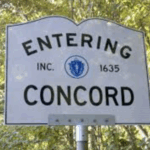 Taking a Mulligan: It’s not too often you get a mulligan in elections (although some states do allow you to spoil early ballots), but recently after an error was discovered in a voter information mailer in Concord, Massachusetts, officials decided to let all those who had cast an early ballot with the error in place to cast a new ballot. The town fixed the problem and is shelling out close to $4,000 to send a corrected mailer to all residents just days before final balloting. Town Manager Kerry Lafleur acknowledged that the offer to change votes feels novel. “I’ve been with the town for nine years,” she said. “I don’t remember anything like that in my time.” Town Clerk Kaari Mai Tari confirmed in an email to The Concord Bridge: “This scenario has not come up in Concord before.” Concordians who have already voted via mail-in balloting or in-person absentee voting and want to change their vote based on new information can send a written request to have their vote spoiled and a new ballot mailed. Tari said 698 ballots had been cast as of August 12.
Taking a Mulligan: It’s not too often you get a mulligan in elections (although some states do allow you to spoil early ballots), but recently after an error was discovered in a voter information mailer in Concord, Massachusetts, officials decided to let all those who had cast an early ballot with the error in place to cast a new ballot. The town fixed the problem and is shelling out close to $4,000 to send a corrected mailer to all residents just days before final balloting. Town Manager Kerry Lafleur acknowledged that the offer to change votes feels novel. “I’ve been with the town for nine years,” she said. “I don’t remember anything like that in my time.” Town Clerk Kaari Mai Tari confirmed in an email to The Concord Bridge: “This scenario has not come up in Concord before.” Concordians who have already voted via mail-in balloting or in-person absentee voting and want to change their vote based on new information can send a written request to have their vote spoiled and a new ballot mailed. Tari said 698 ballots had been cast as of August 12.
 Sticker News: Kentucky Secretary of State Michael Adams announced the nine finalists for the 2025 “I Voted” Sticker Contest. “By offering designs for our ‘I Voted’ sticker, Kentucky students have done their part to promote voting,” said Adams. “Now, it is up to Kentuckians of all ages to determine the winner.” Kentuckians can cast their ballot for their favorite sticker at the Secretary of State’s Office booth at the Kentucky State Fair from August 14-24. The top vote getter’s design will be printed on stickers and sent to county clerks to provide to voters during the May 2026 primary election.
Sticker News: Kentucky Secretary of State Michael Adams announced the nine finalists for the 2025 “I Voted” Sticker Contest. “By offering designs for our ‘I Voted’ sticker, Kentucky students have done their part to promote voting,” said Adams. “Now, it is up to Kentuckians of all ages to determine the winner.” Kentuckians can cast their ballot for their favorite sticker at the Secretary of State’s Office booth at the Kentucky State Fair from August 14-24. The top vote getter’s design will be printed on stickers and sent to county clerks to provide to voters during the May 2026 primary election.
Personnel News: Tommy Gong is the new Lane County, Oregon clerk. Vermont Secretary of State Sarah Copeland-Hanzas has announced her 2026 re-election bid. Penny Githens has joined the Monroe County, Indiana board of elections. Antioch, California City Clerk Melissa Rhodes has resigned. Dallas County, Texas Elections Administrator Heider Garcia has submitted his resignation, he will be joining Hart InterCivic as senior vice president of customer success. Terrence Davis, a former state trooper plans to seek the office of South Dakota secretary of state for the Democratic Party. After two decades as assistant city clerk, Mary Ann Giza is now at the helm as Easthampton, Massachusetts’ new city clerk.
Ballot Measures, Legislation & Rulemaking
 Denver, Colorado: Denver City Council on August 11 rejected a proposal to bring ranked choice voting to Colorado’s largest city, but moved forward with another change to the city elections. The effort to bring ranked choice voting to Denver failed in a 6-7 vote. The proposal would have converted all races in Denver to a ranked choice model, with voters ranking up to six candidates for elected positions like mayor, council member and city clerk. If the council had approved the measure, it would have gone before Denver voters this November. Denver voters have shown some interest in ranked choice voting — it was one of the few counties where a majority of voters approved Prop. 131, an earlier statewide proposal for ranked choice voting. But with the council’s action on Monday, the measure will not appear on the ballot this November.
Denver, Colorado: Denver City Council on August 11 rejected a proposal to bring ranked choice voting to Colorado’s largest city, but moved forward with another change to the city elections. The effort to bring ranked choice voting to Denver failed in a 6-7 vote. The proposal would have converted all races in Denver to a ranked choice model, with voters ranking up to six candidates for elected positions like mayor, council member and city clerk. If the council had approved the measure, it would have gone before Denver voters this November. Denver voters have shown some interest in ranked choice voting — it was one of the few counties where a majority of voters approved Prop. 131, an earlier statewide proposal for ranked choice voting. But with the council’s action on Monday, the measure will not appear on the ballot this November.
 Ohio: A pair of Democratic state lawmakers want to give voters the chance to sign up for absentee ballots permanently. Eight states allow all their citizens to opt in to regular absentee voting, and another 11 allow specific populations like people with disabilities to do so, too. But under current law in Ohio, voters must file a new absentee ballot request with every single election. Ohio House Bill 400 would create several avenues for voters to sign up for the permanent absentee ballot list. The measure directs the Ohio Secretary of State to develop a new form for voters to add their name; voter registration, change of address and change of name forms would all get a new box allowing voter to opt in as well. Ditto the online voter registration portal. Finally, anytime a voter requests an absentee ballot for an individual election, they could also sign up for absentee ballots going forward. The proposal doesn’t direct county boards to send the actual ballot. Instead, voters would get the ballot request form. To get an actual ballot the voter has to return that form with identifying information including date of birth, social security number or driver’s license and their signature. “Folks who regularly vote by mail can voluntarily opt into being part of a system where they’re always going to get an application to vote by mail,” Rader explained. “So they don’t have to go seek that out every election. They don’t have to go find a form, or go online and request a form and remember to do that, put it on their calendar. So, it just kind of removes a step,” he added, “makes it a little bit easier for folks that prefer to vote by mail.”
Ohio: A pair of Democratic state lawmakers want to give voters the chance to sign up for absentee ballots permanently. Eight states allow all their citizens to opt in to regular absentee voting, and another 11 allow specific populations like people with disabilities to do so, too. But under current law in Ohio, voters must file a new absentee ballot request with every single election. Ohio House Bill 400 would create several avenues for voters to sign up for the permanent absentee ballot list. The measure directs the Ohio Secretary of State to develop a new form for voters to add their name; voter registration, change of address and change of name forms would all get a new box allowing voter to opt in as well. Ditto the online voter registration portal. Finally, anytime a voter requests an absentee ballot for an individual election, they could also sign up for absentee ballots going forward. The proposal doesn’t direct county boards to send the actual ballot. Instead, voters would get the ballot request form. To get an actual ballot the voter has to return that form with identifying information including date of birth, social security number or driver’s license and their signature. “Folks who regularly vote by mail can voluntarily opt into being part of a system where they’re always going to get an application to vote by mail,” Rader explained. “So they don’t have to go seek that out every election. They don’t have to go find a form, or go online and request a form and remember to do that, put it on their calendar. So, it just kind of removes a step,” he added, “makes it a little bit easier for folks that prefer to vote by mail.”
 U.S. Virgin Islands: Senators failed to advance two election reform bills that would have reshaped how political parties nominate candidates and clarified the balance of power between the Board of Elections and the Supervisor of Elections, leaving long-debated conflicts and outdated laws in place for another election cycle. Bills to clarify election laws, address quorum contradictions and grant the Board of Elections final authority over the Supervisor of Elections remained in committee after they did not receive the necessary second motions by members of the Senate Committee on Government Operations, Veterans Affairs and Consumer Protection to move them forward during a hearing on August 8. Both measures, sponsored by Sen. Alma Francis Heyliger, proposed amendments to Title 18 of the Virgin Islands Code. Bill 36-0071 would have set a process for political parties to choose nominees for public office. Bill 36-0073 would have defined the powers of the Supervisor of Elections and the Board. At the hearing, Board of Elections Chairman Raymond Williams and Supervisor of Elections Caroline Fawkes urged lawmakers to modernize Title 18, which governs the territory’s election laws and has not been updated in more than 30 years. Bill 36-0073 would have codified that the Supervisor and Deputy Supervisor of Elections could appeal their removal to Superior Court, reaffirmed that there is a singular Board of Elections and given the Board explicit authority to overrule decisions of the Supervisor. After further discussion, both bills died in committee from lack of support.
U.S. Virgin Islands: Senators failed to advance two election reform bills that would have reshaped how political parties nominate candidates and clarified the balance of power between the Board of Elections and the Supervisor of Elections, leaving long-debated conflicts and outdated laws in place for another election cycle. Bills to clarify election laws, address quorum contradictions and grant the Board of Elections final authority over the Supervisor of Elections remained in committee after they did not receive the necessary second motions by members of the Senate Committee on Government Operations, Veterans Affairs and Consumer Protection to move them forward during a hearing on August 8. Both measures, sponsored by Sen. Alma Francis Heyliger, proposed amendments to Title 18 of the Virgin Islands Code. Bill 36-0071 would have set a process for political parties to choose nominees for public office. Bill 36-0073 would have defined the powers of the Supervisor of Elections and the Board. At the hearing, Board of Elections Chairman Raymond Williams and Supervisor of Elections Caroline Fawkes urged lawmakers to modernize Title 18, which governs the territory’s election laws and has not been updated in more than 30 years. Bill 36-0073 would have codified that the Supervisor and Deputy Supervisor of Elections could appeal their removal to Superior Court, reaffirmed that there is a singular Board of Elections and given the Board explicit authority to overrule decisions of the Supervisor. After further discussion, both bills died in committee from lack of support.
 Wisconsin: Gov. Tony Evers recently vetoed a bill, AB87/SB95, that would have suspended the right to vote for Wisconsinites convicted of a felony who have served their sentence until they fulfill outstanding court-order obligations, such as fines, costs, restitution or community service. In Wisconsin, people who have served their criminal sentence for a felony, including incarceration and community service, parole, probation and extended supervision, are eligible to vote. But the proposed legislation would have required any outstanding requirements – “fines, costs, fees, surcharges, and restitution [and] any court-ordered community service, imposed in connection with the crime” – to be addressed in full before voting rights were fully restored. In vetoing the proposed legislation, Evers said, “This bill would create additional barriers to make it harder for individuals who have completed their sentences to have their right to vote restored. My promise to Wisconsinites has always been that I will not sign legislation that makes it harder for eligible Wisconsinites to cast their ballot. I will continue to keep that promise.”
Wisconsin: Gov. Tony Evers recently vetoed a bill, AB87/SB95, that would have suspended the right to vote for Wisconsinites convicted of a felony who have served their sentence until they fulfill outstanding court-order obligations, such as fines, costs, restitution or community service. In Wisconsin, people who have served their criminal sentence for a felony, including incarceration and community service, parole, probation and extended supervision, are eligible to vote. But the proposed legislation would have required any outstanding requirements – “fines, costs, fees, surcharges, and restitution [and] any court-ordered community service, imposed in connection with the crime” – to be addressed in full before voting rights were fully restored. In vetoing the proposed legislation, Evers said, “This bill would create additional barriers to make it harder for individuals who have completed their sentences to have their right to vote restored. My promise to Wisconsinites has always been that I will not sign legislation that makes it harder for eligible Wisconsinites to cast their ballot. I will continue to keep that promise.”
Legal Updates
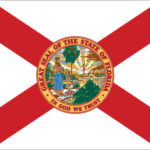 Florida: U.S. District Judge Mark Walker has struck down part of Florida’s controversial 2023 elections law, ruling that a provision barring noncitizens from handling voter registration applications is unconstitutional, but leaving intact most of the law’s other restrictions on third-party voter registration organizations. In a 55-page order, Walker found that the citizenship requirement in SB 7050, which GOP lawmakers pushed to passage in April 2023, violates the 14th Amendment’s equal protection clause because it is “facially discriminatory with respect to alienage.” The decision blocks Florida from enforcing the provision against Humberto Orjuela Prieto, a Colombian-born permanent resident who works as a canvasser, and his employer, Latino civil rights and advocacy nonprofit UnidosUS, one of several plaintiffs in the case. But the injunction is narrowly tailored. Walker said, referencing the U.S. Supreme Court’s Trump v. CASA, Inc. decision in June, that he could not issue a statewide injunction, limiting relief to Orjuela Prieto and UnidosUS. The ruling still effectively blocks the state from penalizing those parties or their employees under the provision.
Florida: U.S. District Judge Mark Walker has struck down part of Florida’s controversial 2023 elections law, ruling that a provision barring noncitizens from handling voter registration applications is unconstitutional, but leaving intact most of the law’s other restrictions on third-party voter registration organizations. In a 55-page order, Walker found that the citizenship requirement in SB 7050, which GOP lawmakers pushed to passage in April 2023, violates the 14th Amendment’s equal protection clause because it is “facially discriminatory with respect to alienage.” The decision blocks Florida from enforcing the provision against Humberto Orjuela Prieto, a Colombian-born permanent resident who works as a canvasser, and his employer, Latino civil rights and advocacy nonprofit UnidosUS, one of several plaintiffs in the case. But the injunction is narrowly tailored. Walker said, referencing the U.S. Supreme Court’s Trump v. CASA, Inc. decision in June, that he could not issue a statewide injunction, limiting relief to Orjuela Prieto and UnidosUS. The ruling still effectively blocks the state from penalizing those parties or their employees under the provision.
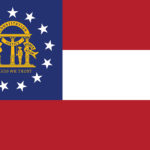 Georgia: A panel of the 11th Circuit U.S. Court of Appeals heard arguments this week over whether civic organizations have a right to hand out food and water at polling places. Civil rights attorneys asked the three-judge panel to uphold a lower court’s ruling that relief activities, including handing out food and water, were a form of speech protected by the First Amendment. A state attorney argued the conduct was too vague to constitute a form of expression and authorities had an overwhelming interest in maintaining order at polling places. The panel also heard arguments on whether the state can require absentee voters to print their date of birth on the outer envelope of an absentee ballot. The Election Integrity Act of 2021, signed into law by Republican Governor Brian Kemp after the 2020 elections, enacted new voting restrictions that spanned from voter ID requirements to polling conduct. Multiple civil rights groups sued to block the law, claiming Georgia’s voting restrictions make it much harder for all Georgians to vote, particularly people of color, new citizens, and religious communities. U.S. District Judge J.P. Boulee, a Donald Trump appointee, issued preliminary injunctions in 2023 blocking the law’s provisions related to line-relief activities and birthdates on absentee ballot envelopes. Citing Holloman v. Harland, Boulee found a reasonable person would interpret line-relief activities as expressive conduct protected by the First Amendment. Georgia Solicitor General Stephen J. Petrany argued at Wednesday’s hearing that a reasonable person would not assume that providing water bottles to voters was an activity fraught with deeper meaning. Expressive conduct requires symbolism, he argued, such as a raised fist or rude hand gesture. Even if line-relief activities qualified as expressive conduct, Georgia had the authority to limit speech near a polling place to protect the integrity of the voting process. “Georgia can decide that we don’t want voting to be a raucous event,” Petrany said.
Georgia: A panel of the 11th Circuit U.S. Court of Appeals heard arguments this week over whether civic organizations have a right to hand out food and water at polling places. Civil rights attorneys asked the three-judge panel to uphold a lower court’s ruling that relief activities, including handing out food and water, were a form of speech protected by the First Amendment. A state attorney argued the conduct was too vague to constitute a form of expression and authorities had an overwhelming interest in maintaining order at polling places. The panel also heard arguments on whether the state can require absentee voters to print their date of birth on the outer envelope of an absentee ballot. The Election Integrity Act of 2021, signed into law by Republican Governor Brian Kemp after the 2020 elections, enacted new voting restrictions that spanned from voter ID requirements to polling conduct. Multiple civil rights groups sued to block the law, claiming Georgia’s voting restrictions make it much harder for all Georgians to vote, particularly people of color, new citizens, and religious communities. U.S. District Judge J.P. Boulee, a Donald Trump appointee, issued preliminary injunctions in 2023 blocking the law’s provisions related to line-relief activities and birthdates on absentee ballot envelopes. Citing Holloman v. Harland, Boulee found a reasonable person would interpret line-relief activities as expressive conduct protected by the First Amendment. Georgia Solicitor General Stephen J. Petrany argued at Wednesday’s hearing that a reasonable person would not assume that providing water bottles to voters was an activity fraught with deeper meaning. Expressive conduct requires symbolism, he argued, such as a raised fist or rude hand gesture. Even if line-relief activities qualified as expressive conduct, Georgia had the authority to limit speech near a polling place to protect the integrity of the voting process. “Georgia can decide that we don’t want voting to be a raucous event,” Petrany said.
 Louisiana: The Supreme Court this week released the calendars for the October and November argument sessions. The October session will feature 10 arguments over five days, while the November session will feature nine over five days. Both sessions include important cases. On Oct. 15, the court will hear oral arguments in a Louisiana case that could limit the federal Voting Rights Act. When the court hears argument in Louisiana v. Callais, it will be the second round of arguments in the case, which comes to the court as a challenge to the congressional map that the Louisiana Legislature adopted in 2024. That map, which contained a second majority-Black district, followed a federal court’s ruling that a 2022 map, which contained only one majority-Black district, violated Section 2 of the federal Voting Rights Act, which prohibits election practices that result “in the denial or abridgement of the right of any citizen to vote on account of race, color, or membership in a language minority group.” A group of voters describing themselves as “non-African American” went to federal court, where they argued that the 2024 map was an unconstitutional racial gerrymander – that is, it relied too heavily on race.
Louisiana: The Supreme Court this week released the calendars for the October and November argument sessions. The October session will feature 10 arguments over five days, while the November session will feature nine over five days. Both sessions include important cases. On Oct. 15, the court will hear oral arguments in a Louisiana case that could limit the federal Voting Rights Act. When the court hears argument in Louisiana v. Callais, it will be the second round of arguments in the case, which comes to the court as a challenge to the congressional map that the Louisiana Legislature adopted in 2024. That map, which contained a second majority-Black district, followed a federal court’s ruling that a 2022 map, which contained only one majority-Black district, violated Section 2 of the federal Voting Rights Act, which prohibits election practices that result “in the denial or abridgement of the right of any citizen to vote on account of race, color, or membership in a language minority group.” A group of voters describing themselves as “non-African American” went to federal court, where they argued that the 2024 map was an unconstitutional racial gerrymander – that is, it relied too heavily on race.
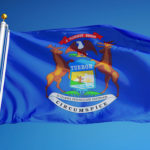 Michigan: A Saginaw County attorney is accusing Gov. Gretchen Whitmer (D) of disenfranchising voters in Michigan’s 35th state Senate district, arguing in a lawsuit that her refusal to call a special election for a long-vacant seat “undermines public trust … and erodes the legitimacy of enacted laws.” “In a democratic republic, the absence of representation is not a mere inconvenience — it is a denial of one of the most fundamental political rights,” attorney Philip Ellison, with Outside Legal Counsel, wrote in a suit filed Monday in the Michigan Court of Claims on behalf of seven local residents. According to Votebeat, the complaint asks a judge to order Whitmer to call a special election within seven days. The governor’s office did not respond to a request for comment on the lawsuit. The seat in the 35th Senate District has been vacant for the last seven months after Democrat Kristen McDonald Rivet was elected to the U.S. House and officially left the Michigan Senate on Jan. 3.
Michigan: A Saginaw County attorney is accusing Gov. Gretchen Whitmer (D) of disenfranchising voters in Michigan’s 35th state Senate district, arguing in a lawsuit that her refusal to call a special election for a long-vacant seat “undermines public trust … and erodes the legitimacy of enacted laws.” “In a democratic republic, the absence of representation is not a mere inconvenience — it is a denial of one of the most fundamental political rights,” attorney Philip Ellison, with Outside Legal Counsel, wrote in a suit filed Monday in the Michigan Court of Claims on behalf of seven local residents. According to Votebeat, the complaint asks a judge to order Whitmer to call a special election within seven days. The governor’s office did not respond to a request for comment on the lawsuit. The seat in the 35th Senate District has been vacant for the last seven months after Democrat Kristen McDonald Rivet was elected to the U.S. House and officially left the Michigan Senate on Jan. 3.
Muhtasin Sadman and Mohammed Hassan, two Hamtramck city council members, are facing felony charges that they forged signatures on absentee ballots in the city’s 2023 council race, according to new court filings, although it’s unclear how many ballots may have been manipulated. According to an April document that Attorney General Dana Nessel used to request a special prosecutor in the case, Sadman and Hassan, along with four others, “conspired to receive unvoted absentee ballots that had been signed by recently naturalized citizens, and to then fill in the candidates of their choosing” in the city’s 2023 election, the records say. They allegedly paid for votes “in order to gain an advantage in local elections,” the document said, and two other council members were also being investigated. Those council members, Abu Musa and Mohammed Alsomiri, have not been charged, according to court records.
 Mississippi: The Republican National Committee (RNC) is asking the U.S. Supreme Court to reject Mississippi’s request to review a federal appeals court decision that struck down the state’s post–Election Day grace period. In a brief filed August 11, the RNC argued the justices should not review the Fifth U.S. Circuit Court of Appeals’ ruling, which held that Mississippi’s five-day grace period for counting mail ballots postmarked by Election Day violates federal law. “The Fifth Circuit correctly held that the federal election day is the day by which ballots must be both cast by voters and received by state officials,” the RNC wrote. “A post-election receipt deadline for mail ballots extends ‘the election’ beyond the ‘day’ set by Congress.” Mississippi law previously allowed mail-in ballots to be counted if they arrive within five business days after the election, so long as they are postmarked on or before Election Day. Grace periods like this are often a safeguard for voters who rely on the mail service to vote — especially military, overseas and rural voters — ensuring that ballots mailed on time aren’t thrown out simply because of postal delays. The RNC, the Mississippi Republican Party and individual voters sued in 2024, claiming that extending the receipt deadline “dilutes the weight of timely, valid ballots” of voters who comply with the deadline.
Mississippi: The Republican National Committee (RNC) is asking the U.S. Supreme Court to reject Mississippi’s request to review a federal appeals court decision that struck down the state’s post–Election Day grace period. In a brief filed August 11, the RNC argued the justices should not review the Fifth U.S. Circuit Court of Appeals’ ruling, which held that Mississippi’s five-day grace period for counting mail ballots postmarked by Election Day violates federal law. “The Fifth Circuit correctly held that the federal election day is the day by which ballots must be both cast by voters and received by state officials,” the RNC wrote. “A post-election receipt deadline for mail ballots extends ‘the election’ beyond the ‘day’ set by Congress.” Mississippi law previously allowed mail-in ballots to be counted if they arrive within five business days after the election, so long as they are postmarked on or before Election Day. Grace periods like this are often a safeguard for voters who rely on the mail service to vote — especially military, overseas and rural voters — ensuring that ballots mailed on time aren’t thrown out simply because of postal delays. The RNC, the Mississippi Republican Party and individual voters sued in 2024, claiming that extending the receipt deadline “dilutes the weight of timely, valid ballots” of voters who comply with the deadline.
 North Carolina: Digital IDs cannot be used to vote in North Carolina until the legislature explicitly allows it, under a settlement between the state Board of Elections and the Republican National Committee. The RNC and the state GOP sued the state Board last year after it voted along party lines to allow UNC-Chapel Hill students to use their mobile UNC One cards as photo ID. University student and facility IDs, if the state Board approves them, are among the acceptable forms of photo identification voters can use at the polls. Many campuses have replaced physical cards with multipurpose digital IDs. UNC’s was the first digital university ID the state Board approved. A trial court last year sided with the state Board, but the state Appeals Court blocked use of the mobile IDs. Students weren’t allowed to use them for the 2024 election. As part of the agreement dismissing the lawsuit, the state Board agreed to not approve any more digital IDs unless the legislature passes a law allowing them. Democrats held a 3-2 majority on the elections board last year. Republicans now have a majority.
North Carolina: Digital IDs cannot be used to vote in North Carolina until the legislature explicitly allows it, under a settlement between the state Board of Elections and the Republican National Committee. The RNC and the state GOP sued the state Board last year after it voted along party lines to allow UNC-Chapel Hill students to use their mobile UNC One cards as photo ID. University student and facility IDs, if the state Board approves them, are among the acceptable forms of photo identification voters can use at the polls. Many campuses have replaced physical cards with multipurpose digital IDs. UNC’s was the first digital university ID the state Board approved. A trial court last year sided with the state Board, but the state Appeals Court blocked use of the mobile IDs. Students weren’t allowed to use them for the 2024 election. As part of the agreement dismissing the lawsuit, the state Board agreed to not approve any more digital IDs unless the legislature passes a law allowing them. Democrats held a 3-2 majority on the elections board last year. Republicans now have a majority.
 Texas: More than a dozen men and women who were charged in connection with a vote-harvesting scandal appeared in court on August 13. All 15 suspects appeared either in-person at the Frio County Courthouse or virtually for the Wednesday morning hearing. Six of the 15 suspects, who were indicted in May, entered not guilty pleas earlier this year. The other nine, who were indicted in June, officially pled not guilty in court this week. Because other judges in the county excused themselves from the case, it was presided by state Judge Sid Harle of the 4th Administrative Judicial Region via Zoom. The 4th Administrative Judicial Region spans 22 counties, including Frio.
Texas: More than a dozen men and women who were charged in connection with a vote-harvesting scandal appeared in court on August 13. All 15 suspects appeared either in-person at the Frio County Courthouse or virtually for the Wednesday morning hearing. Six of the 15 suspects, who were indicted in May, entered not guilty pleas earlier this year. The other nine, who were indicted in June, officially pled not guilty in court this week. Because other judges in the county excused themselves from the case, it was presided by state Judge Sid Harle of the 4th Administrative Judicial Region via Zoom. The 4th Administrative Judicial Region spans 22 counties, including Frio.
Opinions This Week
National Opinions: Department of Justice | Native American voting rights, II | Midterms, II | Election integrity | Voting rights | Ballot initiatives | Voter ID | Voting Rights Act | Election security, II
Alabama: Voting rights
California: Voting rights | Redistricting
Colorado: County clerks
Connecticut: Election security
Hawaii: Voter access
Maine: Voter ID
Massachusetts: Voter ID
Michigan: Ranked choice voting
North Dakota: Voting Rights Act
Ohio: Voting rights | Ranked choice voting
Pennsylvania: Voting rights
South Dakota: Election reform
Texas: Litigation
Wisconsin: Voter ID
Upcoming Events
Michigan Association of County Clerks 117th Annual Summer Conference: When: August 17-20. Where: Mt. Pleasant.
WMCA Annual Conference: When: August 19-22. Where: LaCrosse.
Election Center Annual Conference: The Election Center Annual Conference will be held in Salt Lake City. The conference will run August 20-22 and CERA courses will be offered August 23 and 24. The CERA courses offered will be: Course 5 (Ethics); Course 6 (Communications & Public Relations); and Two renewal courses to be announced. When: August 20 to 24. Where: Salt Lake City.
Protecting the Election: AI and Governance Conference at WashU: Join us for this two-day in-person research and practitioner conference at WashU on October 16-17, 2025, to discuss research regarding AI and governance and how this applies to U.S. elections. Research topics include how chatbots can be used to engage with voters, how social media influences voters, what the electorate knew (or did not know) about the candidates and issues during recent elections, misinformation in elections, rhetoric about election integrity, and AI strategies for the administration of elections. We will also hear from practitioners during the conferences about their experiences with and needs for AI in recent elections and their intentions for future use of AI in elections. When: Oct. 16-17. Where: St. Louis.
Job Postings This Week
electionlineWeekly publishes election administration job postings each week as a free service to our readers. To have your job listed in the newsletter, please send a copy of the job description, including a web link to mmoretti@electionline.org. Job postings must be received by 5pm on Wednesday in order to appear in the Thursday newsletter. Listings will run for three weeks or till the deadline listed in the posting.
Administrative Specialist, King County, Washington – The Department of Elections is searching for energetic and resourceful professionals who like to “get stuff done”. The Administrative Specialist II positions in the Voter Services Department combines an exciting, fast-paced environment with the opportunity to cultivate talents and apply a variety of skills. The ideal candidate will have a desire to help ensure the democratic process through public service. They will thrive in an innovative environment and will not hesitate to roll up both sleeves, work hard, have fun, and get the job done. Job Duties: Provide excellent customer service to internal and external customers in person, via telephone, and via e-mail by processing voter registrations, communicating election program information and explaining election procedures, guidelines and regulations. Provide backup support for translation and/or interpreting and proof election-related documents and web materials from English to Chinese (traditional text). This includes but is not limited to voter registration information, letters, and other correspondence, notice of elections, ballot titles, voters’ pamphlet information, candidate statements, ballot measures, etc. to limited English speaking (LES) voters. Perform production-level computer work which includes accurate data entry, retrieving and editing records. Organize and coordinate work activities and assist with providing training and one-on-one instruction to diverse staff. Set up records and file documents in both electronic and paper formats. Review documents for proper format, accuracy, completion, eligibility, and other legal guidelines. Audit work group data entry activities to ensure performance quality and efficiency of work. Utilize spreadsheets, word documents and reports to track and document performance data. Research and resolve questions from staff, citizens and stakeholders. Document and improve work processes, procedures and instructions. Salary: $27.03 – $34.40 Hourly. Application: For the complete job listing and to apply, click here.
Assistant Registrar of Voters, Santa Clara County, California– Under general direction, the Assistant Registrar of Voters supports the planning, organization, and oversight of the County Registrar of Voters Department. This executive leadership position reports directly to the Registrar of Voters and plays a key role in administering and managing departmental operations. The department is responsible for voter registration, the conduct of elections, and related electoral services. The Assistant Registrar of Voters helps ensure that all activities are carried out efficiently, accurately, and in compliance with applicable laws and regulations. This position may assume the responsibility of the Department in the absence of the Registrar of Voters. Salary: $194,184.52 – $249,180.63. Application: For the complete job listing and to apply, click here.
Community Engagement Coordinator, North Charleston, South Carolina– Partner with the Community Engagement Manager to identify and expand non-partisan community relationships. Cultivate connections with local businesses and civic organizations to boost visibility and support. Solicit and analyze community feedback to enhance outreach strategies. Create brochures, flyers, presentations, and digital content to educate the public about elections and voting procedures.Collaborate with the Marketing and Communications Manager to maintain clear, consistent, and timely messaging across platforms. Manage and update the outreach section of the agency’s website. Deliver presentations and training during outreach events. Plan and coordinate mid-scale public events such as National Voter Registration Day and poll worker appreciation initiatives. Represent BVRE at outreach events, tabling opportunities, and community meetings. Track outreach activity and report on engagement metrics and outcomes. Support special projects including the “I Voted” sticker contest, Adopt a Polling Location, and poll worker recruitment. Research best practices to enhance and expand outreach programming. Assist in maintaining a centralized repository of outreach materials and resources. Salary: $50,440 – $66,060. Application: For the complete job listing and to apply, click here.
Customer Success Manager, ElectSure– ElectSure, a leading provider of training and technology solutions for election administration offices, is seeking a proactive and empathetic Customer Success Manager (CSM) to lead client satisfaction and success across our service lifecycle. This is a high-impact role designed for a results-oriented professional who thrives in a fast-paced, startup environment and is passionate about delivering excellence to public-sector clients. Application: For the complete job listing and to apply, click here.
Deputy Auditor of Elections, Story County, Iowa– Oversees voter registration and election functions of the Auditor’s Office, including staff maintenance of registration records and the conduct of federal, state and local elections pursuant to law; prepares mandated reports and legal publications; assists the general public and responds to requests for public information. Job Duties/Responsibilities: Oversees voter registration records in compliance with state and federal law. Prepares and implements a plan to conduct each election. Prepares and monitors election-related budget items. Monitors, researches, interprets, and administers federal, state, and county rules, regulations, and laws. Maintains proper security of all election materials and equipment. Understands and uses applicable software to prepare elections materials and equipment. Maintains proper retention timeline of election materials as required. Maintains and prepares voting equipment and conducts public testing. Inspects and communicates with polling locations as required. Manages and supervises employees. May perform the duties of other managers and the County Auditor in their absence. Other duties as assigned. Salary:$71,020.20 to $82,856. Deadline: August 17. Application: For the complete job listing and to apply, click here.
Deputy of Elections, Yolo County, Califorina– The Yolo County Assessor/Clerk- Recorder/Elections Department is seeking an accomplished professional to serve as Deputy of Elections. This leadership position plays a pivotal role in ensuring the efficient, transparent, and secure administration of elections in Yolo County. The role requires strategic oversight, operational management, and technical expertise, as well as the ability to lead a skilled team in delivering services that uphold the highest standards of public trust. Yolo County offers a unique quality of life—combining the charm of historic communities, vibrant cultural offerings, and a strong sense of civic engagement with the advantages of proximity to Sacramento and UC Davis. Our department is nationally recognized for excellence in elections administration and is deeply committed to fostering professional growth, innovation, and collaboration among staff. We encourage professionals with proven leadership experience, strong analytical and organizational skills, and a commitment to serving the public to apply. This is an excellent opportunity to join a respected, forward-thinking department and to make a meaningful impact! Salary: $111,321.60 – $135,304.00 a year. Deadline: August 25. Application: For the complete job listing and to apply, click here.
Election Analyst, Charleston County, South Carolina– Are you a detail-oriented professional with a passion for public service and a knack for technology? Join us as an Election Analyst and play a vital role in ensuring the security, efficiency, and accuracy of elections in our community. At the Board of Voter Registration and Elections, we are not just managing elections—we’re shaping the foundation of democracy. As an award-winning office known for our commitment to excellence and innovation, we invite you to be part of a team that is redefining what it means to serve the public. Our mission is to daily serve the Charleston County voting constituency with Vigilance, Objectivity, and Transparency in a manner that promotes due diligence Excellence in all aspects of Elections Management. Why Join Us: 1. Trusted Stewards of Democracy: We lead the way in secure, accessible, and transparent elections, earning statewide and national recognition for our performance. 2. Frontline Impact: As an Election Analyst, your work will directly impact how voters experience democracy—from the reliability of equipment to the confidence in results. 3.Culture of Innovation: We’re constantly improving election systems, training programs, and precinct operations to ensure our voters get the best experience possible. Salary: $45,052 – $58,988. Application: For the complete job listing and to apply, click here.
Election Assistant, St. Charles County, Missouri – The purpose of this position is to assist the Director of Elections in the Administration of elections. Lead and train intermittent employees at all satellite voting sites. Set up and manage election equipment, on demand ballot printers, poll pad voter check in stations and ADA compliant ballot marking devices at satellite voting sites. Lead Initiative Petition temporary staff. This position acts under the supervision of the Assistant Director of Elections. Salary: $45,192.76. Application: For the complete job listing and to apply, click here.
Election Program Supervisor, Clark County, Nevada– The Clark County Election Department is seeking qualified candidates for the Election Program Supervisor positions in the Mail Ballot and Administration divisions. These positions assist in supervising permanent and temporary staff, reviewing and evaluating the work of others, and directing specific operational functions including budgeting and hiring of staff. The Election Program Supervisor coordinates with vendors and community partners to ensure a successful election process. These positions require mandatory overtime during various periods in the election cycle. The overtime can include weekends and may be with little to no notice. Salary: $30.38 – $44.84 Hourly. Deadline: August 19. Application: For the complete job listing and to apply, click here.
Election Specialist, Candidate Services, Palm Beach County, Florida– This position is responsible for the management and execution of services provided to candidates, political committees, electioneering communication organizations, political parties, community development districts, and special taxing districts. This includes establishing and maintaining an organized system for managing the required forms and records associated with filing and qualifying for office, candidate petitions, campaign finance reporting, financial disclosures, initiative petitions, and other related activities. Candidate Services staff must be organized and personable with a great attitude, be able to work well in a team environment, and meet deadlines under pressure. Excellent work ethic, including consistent performance, integrity, reliability, and attendance, is a must. Must be detail-oriented, be able to handle simultaneous projects, and be a self-starter. Salary: $21.63 – $24.04. Application: For the complete job listing and to apply, click here.
Elections Filing Manager, Arizona Secretary of State’s Office– The Elections Filing Manager oversees the Division’s filing operations and works with other Elections Manager(s) and the Deputy State Election Director to ensure the Division’s compliance with state and federal laws and regulations relating to initiative, referenda, recalls, new party and candidate nomination petition processing, E-Qual, petition circulator registration, officeholder financial disclosures, campaign finance and lobbying filings. The EFM manages Division staff and interns, and communicates frequently with counties, cities/towns, officeholders, candidates, and the regulated community. Manages the day-to-day operations of the Elections Filing Team. Responsible for managing staff, projects, and operations and ensuring compliance related to initiative/referenda/recall/new party/candidate nomination filings and processing, petition circulator registration, official events such as the official canvass and Electoral College, campaign finance, E-Qual, officeholder financial disclosures and lobbying. Responsible for ensuring related handbooks and forms are created/updated timely and accurately. Responsible for the filing internship program. Act as project manager for election related IT systems including but not limited to Beacon, Candidate Portal, E-Qual, EMS, Circulator Portal, Lobbyist Portal and the Petition Management Services System. Oversee the development of all election related IT systems, provide guidance to IT regarding the business requirement documents for election related IT systems and work with staff to provide specifications/guidance for IT development. Ensures legal compliance and functionality and facilitate on-going positive user experience. Provide research and confirmation of the statutory requirements of filings, conduct QA tests on the election related IT systems and software. Assists with customer service needs on topics such as E-Qual, campaign finance, petition filings and financial disclosures. Helps create and maintain accurate content for the website in areas specific to their role. Application: For the complete job listing and to apply, click here.
IT Assistant Manager, Palm Beach County, Florida– The Assistant IT Manager plays a supportive role in the smooth operation of the IT department, ensuring that both the technical infrastructure and the team are aligned with the organization’s goals. This position involves collaborating closely with the Election Technology Director to oversee the implementation of technology solutions that meet the needs of the organization. The Assistant IT Manager helps maintain an efficient and effective IT environment. Oversee daily operations of the IT department, including help desk operations and performance, troubleshooting issues, and ensuring efficient workflow. Hold department meetings and provide weekly performance summary. Manage IT projects under the direction of the Election Technology Director, ensuring timely completion, budget requirements, and organizational needs. Enforce IT policies and procedures to ensure data security, network access, and system availability. Assist in the management of IT staff by developing skills, coaching, and communicating job expectations. Coordinate vendor renewals, assist with IT budget development, and manage grant applications. Evaluate and assist in maintaining the organization’s disaster recovery and business continuity plans for IT. Assist with IT Public Records requests research and fulfillment. Assist the Election Technology Director in all facets of IT operations. Lead projects and mentor team members. Application: For the complete job listing and to apply, click here.
Organizer, Minnesota– We are looking for a creative and collaborative Organizer to join the Common Cause team in Minnesota. This is a key role supporting our organizing and outreach programs and promoting civic engagement across the state. This is a full-time role reporting to the Executive Director, Minnesota and is based in Minnesota, with a preference for candidates located in Olmsted County or St. Cloud, with an expectation to travel around Minnesota at least 2 days per week, with a maximum of 5 days a calendar week during the legislative session, and peak summer engagement season. This is a termed position, starting on November 1, 2025 and ending October 31, 2027. Salary: $63,860 – $80,340 a year. Application: For the complete job listing and to apply, click here.
Physical Security Specialist, Palm Beach County, Florida– This position is responsible for administration of the physical security programs in a manner consistent with Supervisor of Elections Office policies, procedures, quality standards, and applicable local, state, and federal regulations. These programs include conducting facility security risk assessments, assisting with access control, monitoring alarms and CCTV systems, and providing security related training. Must be organized and personable with a great attitude, be able to work well in a team environment, and meet deadlines under pressure. Excellent work ethic, including consistent performance, integrity, reliability, and attendance, is a must. Candidate must be detail-oriented and understand the importance of security and safety for all. Must be available 24/7 365, be able to handle simultaneous projects, and be a self-starter. Application: For the complete job listing and to apply, click here.
Precinct Manager, Charleston County, South Carolina– Are you driven by a passion for democracy and civic engagement? Join the Board of Voter Registration and Elections as a Precinct Manager and play a critical role in delivering seamless, fair, and accessible elections. Key responsibilities: Poll worker recruitment and management; Polling location management; Liaison and community engagement; Support for election operations on Election Day and early voting; and Team leadership. The Board of Voter Registration and Elections is an award-winning organization dedicated to excellence in electoral processes. Our mission is to daily serve the Charleston County voting constituency with Vigilance, Objectivity, and Transparency in a manner that promotes due diligence Excellence in all aspects of Elections Management. We are committed to continuous improvement, innovative practices, and exceptional service to our community, ensuring every voter’s voice is heard. Salary: $68,140 – $89,252. Application: For the complete job listing and to apply, click here.
Program Manager, Center for Tech and Civic Life– When you think about elections, you might think about popular candidates, “I voted” stickers, and all sorts of paperwork and deadlines. But behind the scenes are thousands of election officials in state and local governments who are working hard to make sure ballots are counted and voices are heard. At a time when election officials are facing unprecedented challenges and scrutiny, they need support in order to administer secure and inclusive elections and build trust among the public. As Program Manager for the Values and Standards for Election Excellence (VSEE), you will support adoption and maintenance of a new set of standards that make clear what high performance looks like in U.S. election administration. This is big, bold work at the forefront of election administration, so an entrepreneurial spirit will help you succeed. You’ll report to an Associate Director in the Government Services department. Application: For the complete job listing and to apply, click here.
Program Manager, Common Cause– We are looking for a collaborative and highly organized Program Manager to join the Common Cause team in California. In this role, you will lead and implement state programmatic efforts, manage relationships with key stakeholders, and coordinate advocacy activities to support our programmatic agenda. You will play a key part in advancing our mission to protect democracy and ensure the fair and equitable representation of all communities. The Money in Politics Program Manager will lead statewide efforts to reduce the undue influence of wealthy donors, corporations, and special interests in California’s political system. The role focuses on advancing policies and coalitions that promote campaign finance reform, strengthen disclosure, and improve public financing of elections at the local and state level. This position is ideal for someone passionate about building a more inclusive democracy, experience in policy advocacy, and skilled in organizing diverse coalitions and stakeholders. This is a full-time role reporting to the Deputy Director of California and based in California, with an expectation to travel around the state at least 8-12 days per quarter. We hope our new Program Manager will start in October. Salary: $82,400 – $97,850 a year. Application: For the complete job listing and to apply, click here.
Senior Director, Legislative Affairs, Common Cause– We are seeking a strategic, experienced, and mission-driven Senior Director, Legislative Affairs to lead our federal legislative advocacy work and our strategic approach to advocacy within our states to strengthen our democracy by holding power accountable. In this role, you will be responsible for developing and executing a dynamic federal lobbying strategy, managing high-level relationships with lawmakers and key partners, and building strategic alignment across Common Cause’s policy pillars and state teams. You will serve as a key thought partner in our cross-department campaigns and media efforts that include federal legislative components. This is a full-time role reporting to the Senior Vice President, Policy & Litigation; this role is based in Washington, DC, with an expectation to work in-person at least two days per week, up to five days per week during peak legislative periods, and travel at least four times per year. We hope our Senior Director, Legislative Affairs will start in November. Salary: $128,750 – $144,200 a year. Application: For the complete job listing and to apply, click here.
Senior Elections Supervisor, Placer County, California– The Placer County Clerk-Recorder-Elections Office has a current vacancy for a Senior Elections Supervisor. The Office is looking for someone with experience in the development, supervision, and administration of elections programs. The ideal candidate will have supervised in an elections office or similar agency that emphasizes cooperation, accountability and transparency and has the ability to communicate effectively with management, staff, other county departments, jurisdictions and the voters of Placer County. To learn more about the Elections Division of the Clerk-Recorder-Elections Office please click here. In addition to the minimum education and experience, the ideal candidate will possess experience and vision in the following areas: State and federal election laws; Voting systems; General operating policies and functions of the California Secretary of State’s Office; Best practices and current trends in successful election administration, community education and outreach programs; Principles and techniques of effective employee supervision and development, training, management practices and public administration. Salary: $69,056.00 – $86,195.20/year. Application: For the complete job listing and to apply, click here.
Voter Registration and Absentee Manager, Charleston County, South Carolina– Are you driven by public service and committed to ensuring the accuracy of voter registration? Join us as the Voter Registration and Absentee Manager and lead a team dedicated to upholding the integrity of our processes. Welcome to the Board of Voter Registration and Elections, where we are not just an agency, but a dynamic force committed to excellence in democracy. As an award-winning organization, we pride ourselves on our relentless pursuit of improvement to better serve the voters in our community. This role is pivotal to ensuring secure, accurate, and accessible voter registration and absentee voting services. Salary: $70,000.00 – $82,000.00 Annually. Application: For the complete job listing and to apply, click here.
Voter Services Clerk, Seminole County, Florida – The Voter Services Clerk serves as the primary customer service representative for the Seminole County Supervisor of Elections Office. This position is responsible for the accurate maintenance and entry of voter registration information, ensuring the integrity and confidentiality of voter data, and providing essential assistance to voters, including answering inquiries and processing voter-related documents. The Clerk will also be involved in various clerical and administrative tasks associated with voter services, ensuring compliance with applicable state and federal election laws. Responsibilities include processing new voter registrations, updates or changes to existing registrations, vote-by-mail ballot requests, and returns, as well as petition verifications and other voter record-related tasks, providing accurate voter registration and election information to the public in person, by phone, or via mail, in accordance with Florida state laws, regulations, and procedures, conducting research to resolve issues related to voter registration records, utilizing sources both within the voter database and external government websites or online resources, ensuring the accuracy and completeness of voter registration records by verifying information, validating signatures on candidate and initiative petitions, maintaining and update street maintenance files to ensure an up-to-date and accurate residential address database for Seminole County. Salary: $17 – $22 Hourly. Application: For the complete job listing and to apply, click here.
Marketplace
electionline provides no guarantees as to the quality of the items being sold and the accuracy of the information provided about the sale items in the Marketplace. Ads are provided directly by sellers and are not verified by electionline. If you have an ad for Marketplace, please email it to: mmoretti@electionline.org